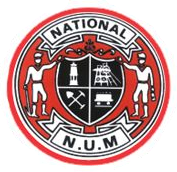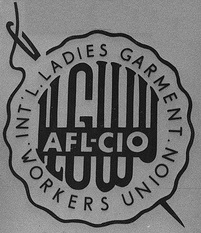Related Research Articles
The history of Guyana begins about 35,000 years ago with the arrival of humans coming from Eurasia. These migrants became the Carib and Arawak tribes, who met Alonso de Ojeda's first expedition from Spain in 1499 at the Essequibo River. In the ensuing colonial era, Guyana's government was defined by the successive policies of Spanish, French, Dutch, and British settlers.
The National Executive Committee (NEC) is the governing body of the UK Labour Party, setting the overall strategic direction of the party and policy development. Its composition has changed over the years, and includes representatives of affiliated trade unions, the Parliamentary Labour Party, constituency Labour parties (CLP), and socialist societies, as well as ex officio members such as the Party Leader and Deputy Leader and several of their appointees.

The National Union of Mineworkers (NUM) is a trade union for coal miners in Great Britain, formed in 1945 from the Miners' Federation of Great Britain (MFGB). The NUM took part in three national miners' strikes, in 1972, 1974 and 1984–85. After the 1984–85 strike and the subsequent closure of most of Britain's coal mines, it became a much smaller union. It had around 170,000 members when Arthur Scargill became leader in 1981, a figure which had fallen in 2015 to an active membership of around 100.

The Bakers, Food and Allied Workers' Union (BFAWU) is a trade union in the United Kingdom. Founded in 1847 in Manchester, it represents workers in the food industry.

David Dubinsky was an American labor leader. He served as president of the International Ladies Garment Workers Union (ILGWU) between 1932 and 1966, took part in the creation of the CIO and was one of the founders of the American Labor Party and the Liberal Party of New York.

The International Ladies' Garment Workers' Union (ILGWU) was once one of the largest labor unions in the United States, one of the first U.S. unions to have a primarily female membership, and a key player in the labor history of the 1920s and 1930s. The union, generally referred to as the "ILGWU" or the "ILG," merged with the Amalgamated Clothing and Textile Workers Union in the 1990s to form the Union of Needletrades, Industrial and Textile Employees (UNITE). UNITE merged with the Hotel Employees and Restaurant Employees Union (HERE) in 2004 to create a new union known as UNITE HERE. The two unions that formed UNITE in 1995 represented 250,000 workers between them, down from the ILGWU's peak membership of 450,000 in 1969.

The Queensland Council of Unions (QCU) is a representative, an advocacy group, or peak body, of Queensland trade union organisations, also known as a labour council, in the Queensland, Australia. As of 2020, 26 unions and 13 regional branches were affiliated with the QCU. The QCU represents unions covering around 350,000 Queensland workers. It is affiliated with the Australian Council of Trade Unions (ACTU). Its offices are located in the suburb of South Brisbane, Queensland. As a peak body for the Queensland trade unions, the objective of the QCU is to achieve industrial, social and political justice for Queensland workers. The management structure of the QCU is made up of a committee of management and an executive of representatives comprised from affiliated unions.
Labour unions emerged in Japan in the second half of the Meiji period, after 1890, as the country underwent a period of rapid industrialization. Until 1945, however, the labour movement remained weak, impeded by a lack of legal rights, anti-union legislation, management-organized factory councils, and political divisions between “cooperative” and radical unionists.

Norman Harold Lever, Baron Lever of Manchester, PC was a British barrister and Labour Party politician.

The Union of Construction, Allied Trades and Technicians (UCATT) was a British and Irish trade union, operating in the construction industry. It was founded in 1971, and merged into Unite on 1 January 2017.
Raymond Jones Gunter was a British Labour Party politician. He was born in Wales and had a background in the railway industry and the British trade union movement – specifically his union, the Transport Salaried Staffs' Association (TSSA).

Internal resistance to apartheid in South Africa originated from several independent sectors of South African society and took forms ranging from social movements and passive resistance to guerrilla warfare. Mass action against the ruling National Party (NP) government, coupled with South Africa's growing international isolation and economic sanctions, were instrumental in leading to negotiations to end apartheid, which began formally in 1990 and ended with South Africa's first multiracial elections under a universal franchise in 1994.
The Labour Party is a centre-left political party in the United Kingdom that has been described as an alliance of social democrats, democratic socialists and trade unionists. In all general elections since 1922, Labour has been either the governing party or the Official Opposition. There have been six Labour prime ministers and thirteen Labour ministries.
The Bagel Bakers Local 338 was a trade union local that was established in the early 1900s in New York City and whose craftsmen were the primary makers of New York's bagels, prepared by hand, until the advent of machine-made bagels in the 1960s led to its end as an independent organization in the 1970s. It was a local union of the Bakery and Confectionery Workers International Union. Until 1964, the union used a different transliteration and called itself the Beigel Bakers Union.
Benjamin "Ben" Schlesinger was a Lithuanian-born American trade union official and newspaper office manager. Schlesinger is best remembered as the nine-time President of the International Ladies Garment Workers Union (ILGWU), serving from 1903–1907, again from 1914–1923, and finally from 1928 until his death in 1932. He was also the managing editor of The Jewish Daily Forward from 1907-1912 and the resident manager of the Chicago edition of that publication beginning in 1923.

Woolf Wess was an Anglo-Jewish anarchist, trade union organizer, and newspaper editor notable for his involvement with the International Working Men's Educational Club and the Freedom Press.

The University and College Union (UCU) is a British trade union in further and higher education representing over 120,000 academics and support staff.
The Amalgamated Association of Beamers, Twisters and Drawers (AABTD) was a British trade union which existed between 1866 and 2002. It represented skilled workers in the cotton industry who were responsible for preparing warp yarns prior to weaving.
The General Union of Loom Overlookers (GULO) was a trade union representing junior supervisors in textile manufacturing in the United Kingdom. While most members were based in Lancashire, it also had members in Yorkshire, East Anglia and Essex.
John Swift (1896–1990) was an Irish trade union leader.